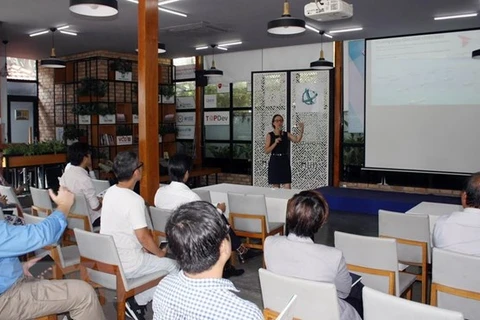 Nguyen Duc Thanh, director of the Vietnam Institute for Economic and Policy Research, addresses the Launching Conference of Vietnam Annual Economic Report 2019 in Hanoi on May 29 (Photo: VNA)
Nguyen Duc Thanh, director of the Vietnam Institute for Economic and Policy Research, addresses the Launching Conference of Vietnam Annual Economic Report 2019 in Hanoi on May 29 (Photo: VNA) Hanoi (VNA) - As many as 85 percent of industrial enterprises in Vietnam still lag behind the fourth Industrial Revolution (Industry 4.0), and only 13 percent are at the beginner level.
Nguyen Duc Thanh, director of the Vietnam Institute for Economic and Policy Research (VEPR) was speaking during the Launching Conference of Vietnam’s Annual Economic Report 2019 co-organised by VEPR and the Friedrich Naumann Foundation (FNF) Vietnam in Hanoi on May 29.
“At present, most Vietnamese enterprises are just standing in front of the threshold of the fourth industrial revolution, not yet really immersed in it,” Thanh said.
“It is important to bring Industry 4.0 into real life and integrate it into the ongoing strategies and programmes of businesses, thereby positioning their future and long-term development,” Thanh said.
“The impact of technology in the workplace has not yet been witnessed significantly. Nevertheless, adoption of robotic automation has already started penetrating some industries including automobile, computer and electronics, electrical equipment.”
Sooner or later, advances in technology will start affecting Vietnam. Given the growth model and its position in the global value chain, the risk to economy may arise in two possible ways, Thanh was quoted as saying in the Vietnam Annual Economic Report 2019.
Firstly, multinational corporations (MNCs) may exit Vietnam in search of a higher skilled labour force. Secondly, enterprises will automate the manufacturing process, laying off a substantial amount of low skilled labourers, the report said.
“The first risk is less likely to impact, however, the second risk seems inevitable. In this context, a priority focus on skills and workforce readiness is critical for Vietnam,” the report added.-VNA
VNA
























